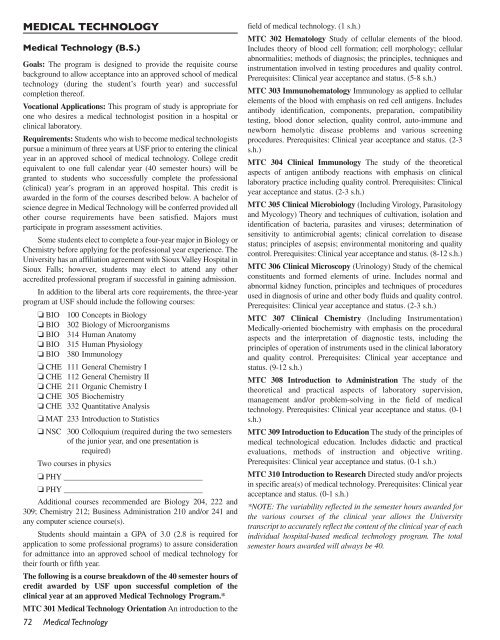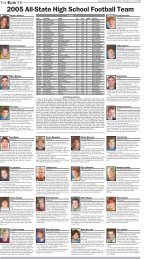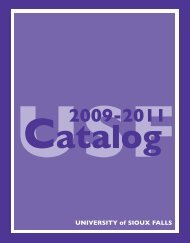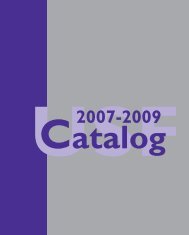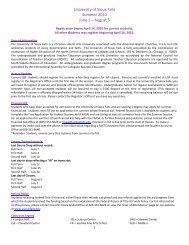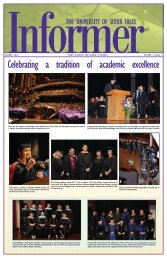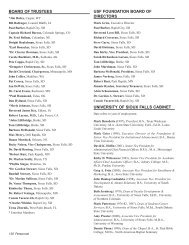USF TELEPHONE DIRECTORY - University of Sioux Falls
USF TELEPHONE DIRECTORY - University of Sioux Falls
USF TELEPHONE DIRECTORY - University of Sioux Falls
You also want an ePaper? Increase the reach of your titles
YUMPU automatically turns print PDFs into web optimized ePapers that Google loves.
MEDICAL TECHNOLOGY<br />
Medical Technology (B.S.)<br />
Goals: The program is designed to provide the requisite course<br />
background to allow acceptance into an approved school <strong>of</strong> medical<br />
technology (during the student’s fourth year) and successful<br />
completion there<strong>of</strong>.<br />
Vocational Applications: This program <strong>of</strong> study is appropriate for<br />
one who desires a medical technologist position in a hospital or<br />
clinical laboratory.<br />
Requirements: Students who wish to become medical technologists<br />
pursue a minimum <strong>of</strong> three years at <strong>USF</strong> prior to entering the clinical<br />
year in an approved school <strong>of</strong> medical technology. College credit<br />
equivalent to one full calendar year (40 semester hours) will be<br />
granted to students who successfully complete the pr<strong>of</strong>essional<br />
(clinical) year’s program in an approved hospital. This credit is<br />
awarded in the form <strong>of</strong> the courses described below. A bachelor <strong>of</strong><br />
science degree in Medical Technology will be conferred provided all<br />
other course requirements have been satisfied. Majors must<br />
participate in program assessment activities.<br />
Some students elect to complete a four-year major in Biology or<br />
Chemistry before applying for the pr<strong>of</strong>essional year experience. The<br />
<strong>University</strong> has an affiliation agreement with <strong>Sioux</strong> Valley Hospital in<br />
<strong>Sioux</strong> <strong>Falls</strong>; however, students may elect to attend any other<br />
accredited pr<strong>of</strong>essional program if successful in gaining admission.<br />
In addition to the liberal arts core requirements, the three-year<br />
program at <strong>USF</strong> should include the following courses:<br />
❏ BIO 100 Concepts in Biology<br />
❏ BIO 302 Biology <strong>of</strong> Microorganisms<br />
❏ BIO 314 Human Anatomy<br />
❏ BIO 315 Human Physiology<br />
❏ BIO 380 Immunology<br />
❏ CHE 111 General Chemistry I<br />
❏ CHE 112 General Chemistry II<br />
❏ CHE 211 Organic Chemistry I<br />
❏ CHE 305 Biochemistry<br />
❏ CHE 332 Quantitative Analysis<br />
❏ MAT 233 Introduction to Statistics<br />
❏ NSC 300 Colloquium (required during the two semesters<br />
<strong>of</strong> the junior year, and one presentation is<br />
required)<br />
Two courses in physics<br />
❏ PHY ___________________________________<br />
❏ PHY ___________________________________<br />
Additional courses recommended are Biology 204, 222 and<br />
309; Chemistry 212; Business Administration 210 and/or 241 and<br />
any computer science course(s).<br />
Students should maintain a GPA <strong>of</strong> 3.0 (2.8 is required for<br />
application to some pr<strong>of</strong>essional programs) to assure consideration<br />
for admittance into an approved school <strong>of</strong> medical technology for<br />
their fourth or fifth year.<br />
The following is a course breakdown <strong>of</strong> the 40 semester hours <strong>of</strong><br />
credit awarded by <strong>USF</strong> upon successful completion <strong>of</strong> the<br />
clinical year at an approved Medical Technology Program.*<br />
MTC 301 Medical Technology Orientation An introduction to the<br />
72 Medical Technology<br />
field <strong>of</strong> medical technology. (1 s.h.)<br />
MTC 302 Hematology Study <strong>of</strong> cellular elements <strong>of</strong> the blood.<br />
Includes theory <strong>of</strong> blood cell formation; cell morphology; cellular<br />
abnormalities; methods <strong>of</strong> diagnosis; the principles, techniques and<br />
instrumentation involved in testing procedures and quality control.<br />
Prerequisites: Clinical year acceptance and status. (5-8 s.h.)<br />
MTC 303 Immunohematology Immunology as applied to cellular<br />
elements <strong>of</strong> the blood with emphasis on red cell antigens. Includes<br />
antibody identification, components, preparation, compatibility<br />
testing, blood donor selection, quality control, auto-immune and<br />
newborn hemolytic disease problems and various screening<br />
procedures. Prerequisites: Clinical year acceptance and status. (2-3<br />
s.h.)<br />
MTC 304 Clinical Immunology The study <strong>of</strong> the theoretical<br />
aspects <strong>of</strong> antigen antibody reactions with emphasis on clinical<br />
laboratory practice including quality control. Prerequisites: Clinical<br />
year acceptance and status. (2-3 s.h.)<br />
MTC 305 Clinical Microbiology (Including Virology, Parasitology<br />
and Mycology) Theory and techniques <strong>of</strong> cultivation, isolation and<br />
identification <strong>of</strong> bacteria, parasites and viruses; determination <strong>of</strong><br />
sensitivity to antimicrobial agents; clinical correlation to disease<br />
status; principles <strong>of</strong> asepsis; environmental monitoring and quality<br />
control. Prerequisites: Clinical year acceptance and status. (8-12 s.h.)<br />
MTC 306 Clinical Microscopy (Urinology) Study <strong>of</strong> the chemical<br />
constituents and formed elements <strong>of</strong> urine. Includes normal and<br />
abnormal kidney function, principles and techniques <strong>of</strong> procedures<br />
used in diagnosis <strong>of</strong> urine and other body fluids and quality control.<br />
Prerequisites: Clinical year acceptance and status. (2-3 s.h.)<br />
MTC 307 Clinical Chemistry (Including Instrumentation)<br />
Medically-oriented biochemistry with emphasis on the procedural<br />
aspects and the interpretation <strong>of</strong> diagnostic tests, including the<br />
principles <strong>of</strong> operation <strong>of</strong> instruments used in the clinical laboratory<br />
and quality control. Prerequisites: Clinical year acceptance and<br />
status. (9-12 s.h.)<br />
MTC 308 Introduction to Administration The study <strong>of</strong> the<br />
theoretical and practical aspects <strong>of</strong> laboratory supervision,<br />
management and/or problem-solving in the field <strong>of</strong> medical<br />
technology. Prerequisites: Clinical year acceptance and status. (0-1<br />
s.h.)<br />
MTC 309 Introduction to Education The study <strong>of</strong> the principles <strong>of</strong><br />
medical technological education. Includes didactic and practical<br />
evaluations, methods <strong>of</strong> instruction and objective writing.<br />
Prerequisites: Clinical year acceptance and status. (0-1 s.h.)<br />
MTC 310 Introduction to Research Directed study and/or projects<br />
in specific area(s) <strong>of</strong> medical technology. Prerequisites: Clinical year<br />
acceptance and status. (0-1 s.h.)<br />
*NOTE: The variability reflected in the semester hours awarded for<br />
the various courses <strong>of</strong> the clinical year allows the <strong>University</strong><br />
transcript to accurately reflect the content <strong>of</strong> the clinical year <strong>of</strong> each<br />
individual hospital-based medical technology program. The total<br />
semester hours awarded will always be 40.


